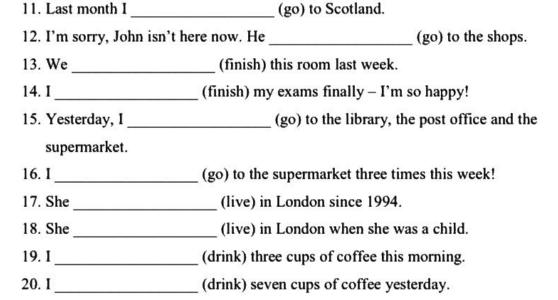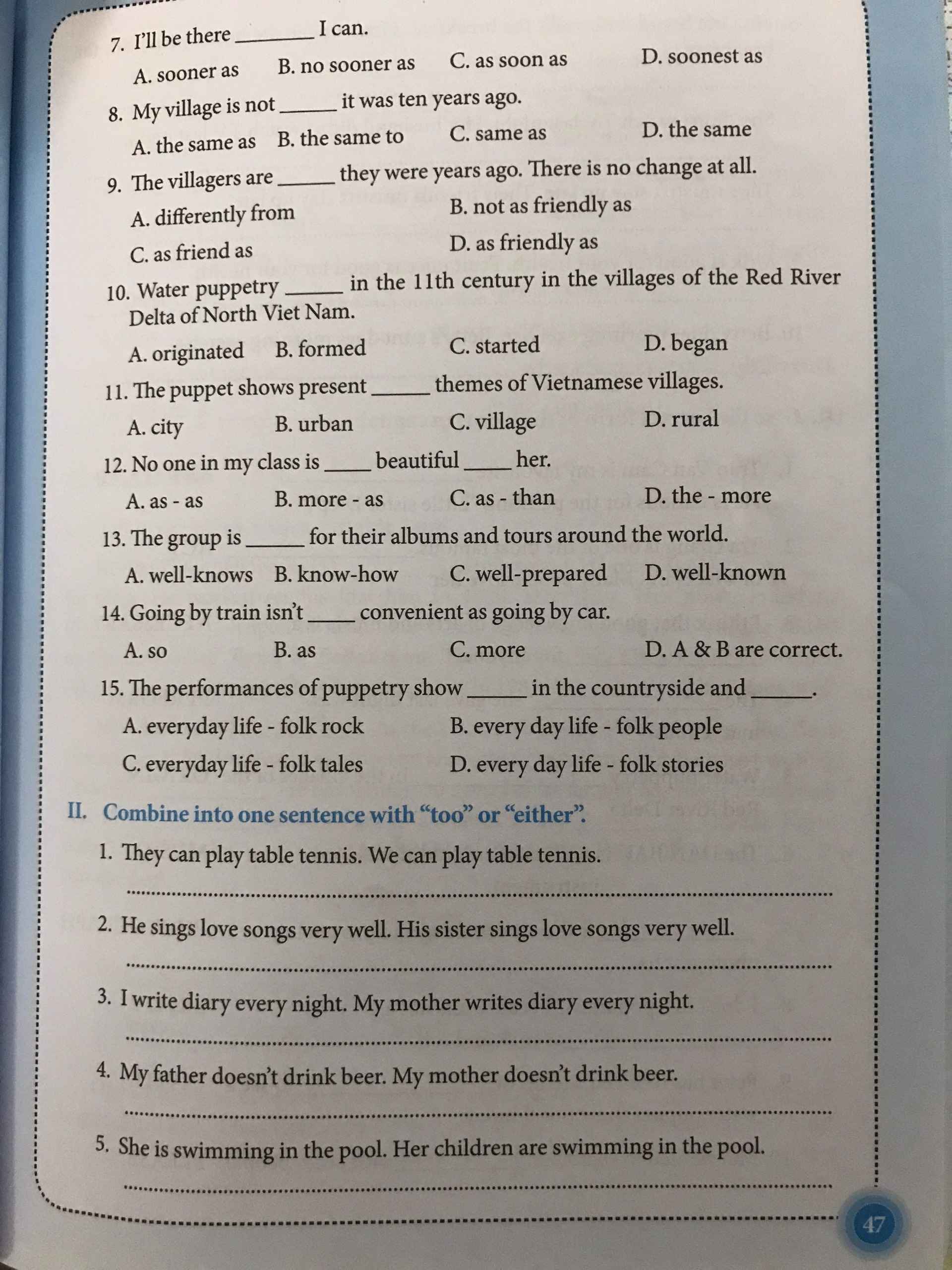
Hãy nhập câu hỏi của bạn vào đây, nếu là tài khoản VIP, bạn sẽ được ưu tiên trả lời.



vsqgdôdldllddldldlllllllllllllllllllllwwwww hello he jdưdq
1.have you been
2.did you go
3.have you ever been
4.did you go
5.have he done
6.have not finished
7.did you play
8.have you ever played
9.have not ever been
10.how did you usually spend /was/

Thì Hiện Tại Đơn:
S + VIB/S/ES
Thì Hiện Tại Tiếp Diễn:
S + Tobe + Ving
Thì tương lai đơn:
S + will + V
Thì Quá Khứ Đơn:
S + Ved/irregularities
1. Thì hiện tại đơn:
Form:
(+) S + V/ V(s;es) + Object...
(-) S + do/ does not + V ?
(?) Do/ Does + S + V?
Cách sử dụng:
- Diễn tả năng lực bản thân:
VD: He plays tennis very well.
- Thói quen ở hiện tại:
VD: I watch TV every night.
- Sự thật hiển nhiên;Chân lí ko thể phủ nhận:
VD: The sun rises in the East and set in the West.
- Diễn tả hành động xảy ra theo lịch trình, thời gian biểu đã định sẵn, đặc biệt là các động từ di chuyển
VD: The train leaves at 7.00 am in the morning.
Các trạng từ đi kèm: always; usually; often; sometimes; occasionally; ever; seldom; rarely; every...
Cách thêm “s,es” vào động từ khi ở thể khẳng định của thì hiện tại đơn:
- Khi chủ ngữ là "I / You / We / They và các chủ ngữ số nhiều khác” thì giữ nguyên động từ
- khi chủ ngữ là "He / She / It và các chủ ngữ số ít khác" thêm "s" hoặc "es" sau động từ
Với những động từ tận cùng bằng "o,x, ch, z, s, sh" thì ta thêm "es" vào sau, còn các động từ khác thì thêm “s”
Khi động từ tận cùng là "y" thì đổi "y" thành "i" và thêm "es" vào sau động từ
Cách phát âm s,es:
/iz/: các động từ kết thúc bằng đuôi: ce, x, z, sh, ch, s, ge
/s/:các động từ kết thúc bằng t, p, f, k, th
/z/:không có trong hai trường hợp trên
2. Hiện tại tiếp diễn:
Form:
(+) S + is/am/are + Ving
(-) S + is/am/are not + Ving
(?) Is/Am/ Are + S + Ving ?
Cách sử dụng:
- Đang xảy ra tại thời điểm nói
VD: I’m doing my homework at this time.
- Sắp xảy ra có dự định từ trước trong tương lai gần.
VD: I’m going to the cinema tomorrow evening
- Không dùng với các động từ chi giác như: SEE; HEAR; LIKE; LOVE...
Các trạng từ đi kèm: At the moment; at this time; right now; now; immediately…
3. Quá khứ đơn:
Form:
(+) S + Ved/ PI-cột 2 trong bảng Động từ bất quy tắc.
(-) S + didn’t + V
(?) Did + S + V
Cách sử dụng:
- Xảy ra và chấm dứt hoán toàn trong quá khứ.
- Nhiều hành động xảy ra liên tiếp trong quá khứ.
- Trong câu điều kiện loại 2.
Các trạng tù đi kèm: Yesterday; the day before yesterday; ago; already; last; in + mốc thời gian trong quá khứ.
Cách đọc ed:
/id/: t,d
/t/: c, ch, s, f, k, p x, sh
/d/: các trường hợp còn lại
94. Tương lai đơn:
Form:
(+) S + will/ shall + V (will ngày nay có thể dùng với tất cả các
(-) S + will/ shall not + V ngôi nhưng shall dùng với “ I” và “WE” )
(?)Will / Shall + S + V
Cách sử dụng:
- Sắp xảy ra trong tương lai không có dự định trước.
- Câu yêu cầu; đề nghị; lời hứa; dự đoán cho tương lai.
- Trong câu điều kiện loại 1.
Các trạng từ đi kèm: tomorrow; the day after tomorrow; next; in + thời gian ở tương lai…

I like English best. Why? There are many reasons. First, it's one of the most important language in the world. When you travel to another part of the world, by using english, you can understand the people, as well as respond or ask for their help. We need it in different fields of life. The English language has become easier to learn more than ever before with the availability of many sources to help people learn easily. And it’s interesting! By learning English, you will also learn about other cultures. Few experiences will make you grow as a person more than learning the values, habits and way of life in a culture that is different from yours. According to all of the reasons above, you can see the importance of english in our life.
I love England very much, because I like their voices. Why ? Many reasons! People who know English will be easy to study, study and work abroad. Knowledge of English makes it easy for you to communicate and move while traveling abroad. Knowing English will allow you to go to a better university or look for a better job. More than ever, at an age when we watch movies or foreign songs, learning English helps us. Without the help of other people or the subtitles ......... That is a few reasons why I like learning English so.

My favorite sport is football. In America people called it Soccer. But I like to call it Football. It has been my favorite sport almost for 10 years, when I was 15 years old, and it still is, even though I’m not practicing it anymore. Nowadays, most of people in the world like football,so it is called the king of sports. Why do people like it? I think the most reason is it easy to play. You can play football every where if you just have a ball with the right size. Not only men play football but also women can play. There is the World Champion for men players each 4 years, and for Women as well. In addition, football have a big attraction. When World cup took place, a large number of millions people watched it on TV and saw it directly. Now there are many football club in each country, even district, school in the world. In the football today there are much more money involved, especially in sponsors. But player also cost a lot, There are many players as C.Ronaldo, Beckham, Zidane who cost over 50 million euro, even over 100 million euro. Many big and famous club have large stadiums with alot of fan in all over the world. They can get a great number of billion US dollar from broadcasting copywrite every year and a big avenue from sponsors and advertising. That prove the attration of football. To me, I like football because it's a useful, healthful, collective but competitive sport. I like overenthusiastic air on stadium on each match. Anyways football always is the most favorite sport of mine.
Please help me correct, many thanks.

thank you very much. Best wishes to you , happy new year.

Dịch bài:
gày 10 tháng 10...
Hoa thân yêu,
Bố mẹ hy vọng con vẫn khỏe mạnh. Bố mẹ đều khỏe cả, sắp đến mùa gặt nữa rồi và bổ mẹ đang làm việc rất căng ở trang trại. Ông của con thường đến làm với bố mẹ. Ông giúp rất nhiều. Ông nói nhiều về con và mong con được khỏe mạnh.
Mẹ nhận được thư của cô con tuần rồi. Cô viết nhiều về con. Vậy là bây giờ con tập thể dục buổi sáng phải không, Hoa? Ở Huế con chẳng bao giờ thích dậy sớm. Ba mẹ rất vui khi nghe con hiện giờ đã dậy sớm.
Mẹ cũng hy vọng con đang tự chăm sóc mình. Cô con rất bận rộn, vậy phải nhớ giặt và ủi quần áo của con, vả đừng ăn quá nhiều kẹo hay thức khuya. Những thứ ấy có hại cho con.
Mẹ nhớ con lắm. Bố mẹ hy vọng sớm đến thăm con ở Hà Nội, có lẽ sau mùa gặt. Đừng quên viết thư cho mẹ nhé Hoa.
Thương,
Mẹ
Trả lời câu hỏi:
a) Because it’s nearly the harvest time again.
b) Her grandfather helps them on the farm.
c) They will probably go to Ha Noi after the harvest.
d) She knows how to take care of herself. She's doing what she didn't do when she was at home in Hue.




1, went
2, has gone
3, finished
4, finished
5, went
6, have gone
7, has lived
8, lived
9, drank
10, drank
1. went
2. has gone
3. finished
4. finished
5. went
6. have gone
7. has lived
8. lived
9. drank
10. drank
Mình ko biết có đúng ko nên có sai thì bạn sửa đi nha!